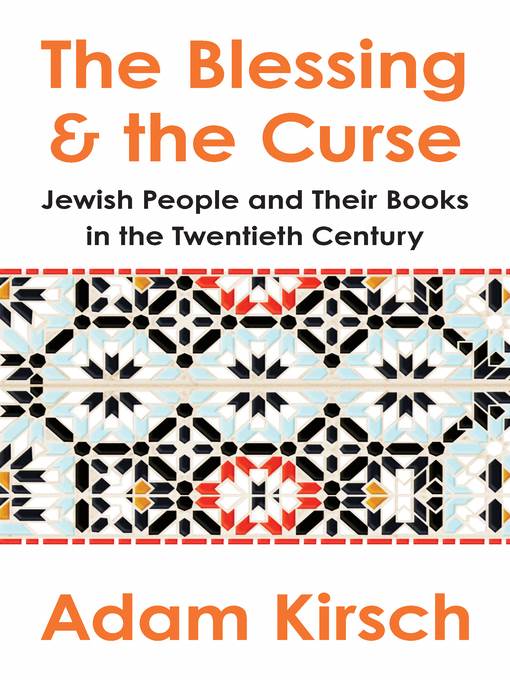
The Blessing and the Curse
The Jewish People and Their Books in the Twentieth Century
- اطلاعات
- نقد و بررسی
- دیدگاه کاربران
نقد و بررسی

Starred review from June 15, 2020
Attentive review of major writings by Jewish authors in a century marked by tragedy and promise. In this natural follow-up to The People and The Books: 18 Classics of Jewish Literature, Kirsch impressively surveys more than 30 significant Jewish authors of the 20th century. At the beginning, the author admits that any such study has its limitations, but the works he chooses are representative of the geographic, ideological, theological, and gender diversity of modern Jewish thought. They also focus the reader's attention on a century of monumental change for global Judaism, marked by mass immigration, brilliant philosophical movements, the horrors of the Holocaust, the creation of Israel as a sovereign state, and unprecedented secularism. Kirsch divides his review into four sections, looking first at Jewish writers in or from Europe whose works relate to the seismic changes that led to the Shoah. Readers will be familiar with many of the authors: Franz Kafka, Isaac Bashevis Singer, Anne Frank, Hannah Arendt. Moving on, the author explores books by American Jews, juggling their place in American society with their Jewish heritage; forming a new, uniquely American Jewish identity; and battling, or embracing, assimilation. The author then looks at the writings of Israeli Jews, astutely examining the realization of Zionism from a variety of angles. As Kirsch shows, S. Yizhar studied the irony of an exiled people creating new exiles of the Arabs; Hannah Senesh, through her diary, exposed the guilt of being a survivor in 1940s Palestine whose mother was left behind to suffer persecution. Finally, Kirsch discusses some of the great thinkers, including Martin Buber and Mordecai Kaplan, who have helped create the version of Judaism that the current century has inherited from the last. Kirsch's work serves as an engrossing overview and introduction to a wide variety of writers, making it especially useful to general readers. Well-crafted, expertly balanced, and deeply humane.
COPYRIGHT(2020) Kirkus Reviews, ALL RIGHTS RESERVED.

Starred review from June 29, 2020
Kirsch’s excellent follow-up to 2016’s The People and the Books again explores “central aspects of Jewish experience” through essential reading material. This time he focuses on crucial works of 20th-century literature by authors including Saul Bellow, Martin Buber, Franz Kafka, and Elie Wiesel. Kirsch argues that events of the 20th century caused a “liquidation of the Jewish concept of exile” and also caused a dramatic expansion of Jewish literature, through which it became “possible to gain an unprecedentedly rich and intimate understanding of Jewish experience.” The ways in which exile was mooted—by the Holocaust, by American acceptance of Jews, and the creation of the nation of Israel—are explored in three geographic sections: Europe, where Jews saw their future disappear; the U.S., where, in Kirsch’s estimation, Jews could voluntarily abandon “most of what had long defined Jewishness”; and Israel, where writers confronted the “tension between Zionist dream and Israeli reality.” Kirsch smoothly places the unprecedented events of the last century in a broad literary context that will help readers deepen understanding of them. Kirsch’s wide, trenchant reading of Jewish writings provides insight for lay readers and scholars alike.

Starred review from July 1, 2020
In this far-ranging survey, celebrated poet biographer Kirsch (Who Wants To Be a Jewish Writer? And Other Essays) explores 20th-century Jewish literature through four primary themes, starting with the alienation and "exile" of Jews and the rise of anti-Semitism in Europe as depicted by (among others) Franz Kafka, Isaac Bashevis Singer, Elie Wiesel, and Primo Levi. Next, Kirsch traces the coming of age of Jewish-American literature in the 20th century, the literary and cultural achievements of Jewish writers in Israel, and the philosophical concerns of modern Jewish thinkers such as Martin Buber, Abraham Heschel, and Joseph Soloveitchik. At the core of this engaging, insightful book are literary analyses of some of the fiction, poetry, and essays of modern Jewish-American writers, chronologically from Abraham Cahan and Anzia Yerierska to Delmore Schwartz, Saul Bellow, and Bernard Malamud. More contemporary authors are discussed (e.g., Philip Roth, Cynthia Ozick, and Grace Paley), with thoughtful attention given to Tony Kushner's Angels in America. In the latter section, Kirsch evaluates literature written in Israel in light of its Jewish content, and in the final chapter elaborates on the nature of modern Judaism, starting with Buber's question: "Why do we call ourselves Jews?" VERDICT The focus throughout this illuminating and invaluable study is on secular modern Jewish writers from Central and Eastern Europe and their descendants. For all Jewish literature collections, and for informed general readers interested in modern Jewish secular literary culture.--Herbert E. Shapiro, Boca Raton, FL
Copyright 2020 Library Journal, LLC Used with permission.




دیدگاه کاربران